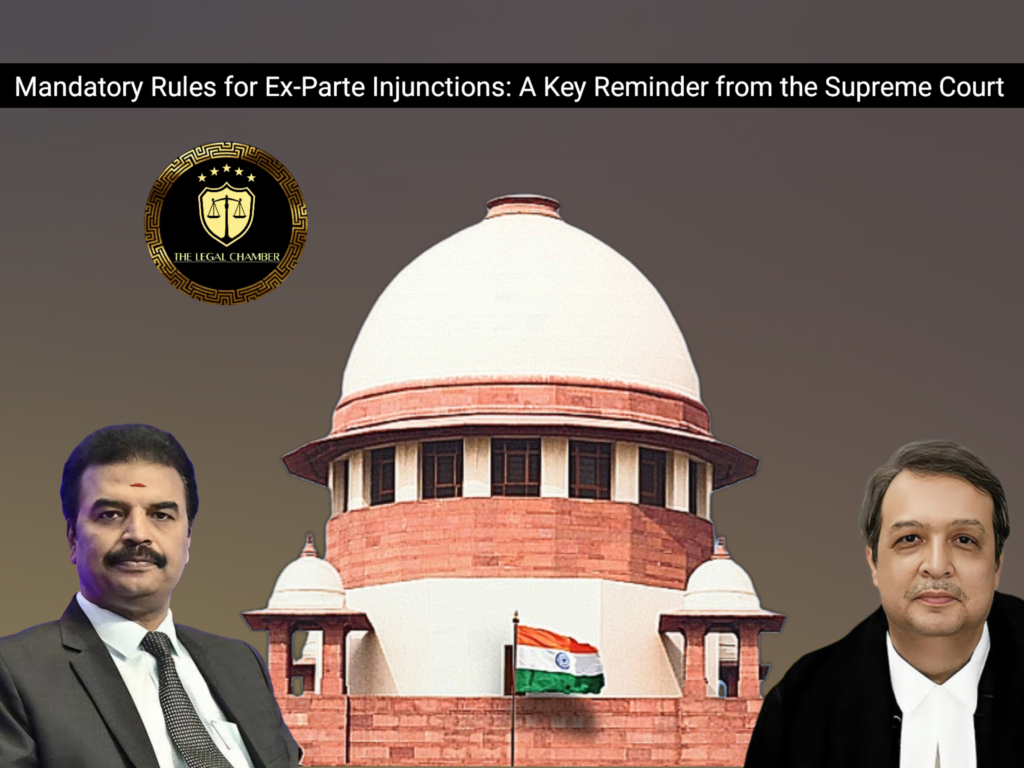
The Supreme Court emphasized that Order 39 Rule 3 CPC mandates recording reasons for granting ex parte injunction and strict compliance with procedural obligations by the applicant. Non-compliance warrants vacation of the ex parte order without adjudicating merits, ensuring the opposite party is not deprived of an early hearing.
Facts Of The Case:
Procedural History:
The procedural history of this case originates with the filing of Civil Suit No. 447 of 2025 by the petitioner (plaintiff) in the court of the Civil Judge (Senior Division), Barabanki. The Trial Court granted an ex parte ad-interim injunction order dated 9-5-2025, directing the parties to maintain status quo on the suit property. Dissatisfied, the respondents (defendants) invoked the supervisory jurisdiction of the High Court of Judicature at Allahabad under Article 227 of the Constitution of India. The High Court, vide its order dated 24-7-2025, allowed the petition, set aside the ex parte injunction, and critiqued the Trial Court’s reasoning, additionally directing the suit’s transfer to a different court. The petitioner then filed the instant Special Leave Petition (Civil) No. 21747 of 2025 before the Supreme Court of India, which disposed of the matter with specific directions for the Trial Court to rehear the injunction application afresh without being influenced by the High Court’s observations.
READ ALSO:Supreme Court Rules: Conspiracy Can Be Proven by Conduct, Not Just Direct Evidence
Court Observation:
The Supreme Court observed that the provisions of Order 39 Rule 3 of the Code of Civil Procedure are mandatory in nature. It emphasized that an ex parte injunction should not be granted ordinarily and is an exception, permissible only when the court records its reasons that the very object of granting the injunction would be defeated by any delay. The Court further held that this exception is coupled with a strict obligation on the applicant to comply with the procedural mandates of clauses (a) and (b) of the proviso, which require delivering the application documents to the opposite party. It noted that any non-compliance with these mandatory procedural obligations by the applicant would warrant the vacation of the ex parte injunction order without any adjudication on the merits of the case, as such conduct deprives the opposite party of an opportunity for an urgent hearing.
Final Decision & Judgement:
The Supreme Court disposed of the Special Leave Petition without interfering with the High Court’s order that had set aside the ex parte injunction. However, it modified the procedural trajectory by directing the Trial Court to hear the injunction application afresh on its own merits in accordance with law. The apex court expressly mandated that this rehearing must be conducted bipartitely, with both parties present, and without being influenced by any observations made in the High Court’s impugned order. The merits of the injunction were left open for determination by the Trial Court, effectively vacating the ex parte order due to the procedural non-compliance and restoring the opportunity for a proper, heard adjudication.
Case Details:
Case Title: Time City Infrastructure and Housing Limited Lucknow Vs. The State of U.P. & Ors. Citation: 2025 INSC 966 Appeal Number: Special Leave Petition (Civil) No. 21747 of 2025 Date of Judgement: 11th August, 2025 Judges/Justice Name: Justice J.B. Pardiwala and Justice R. Mahadevan
Download The Judgement Here